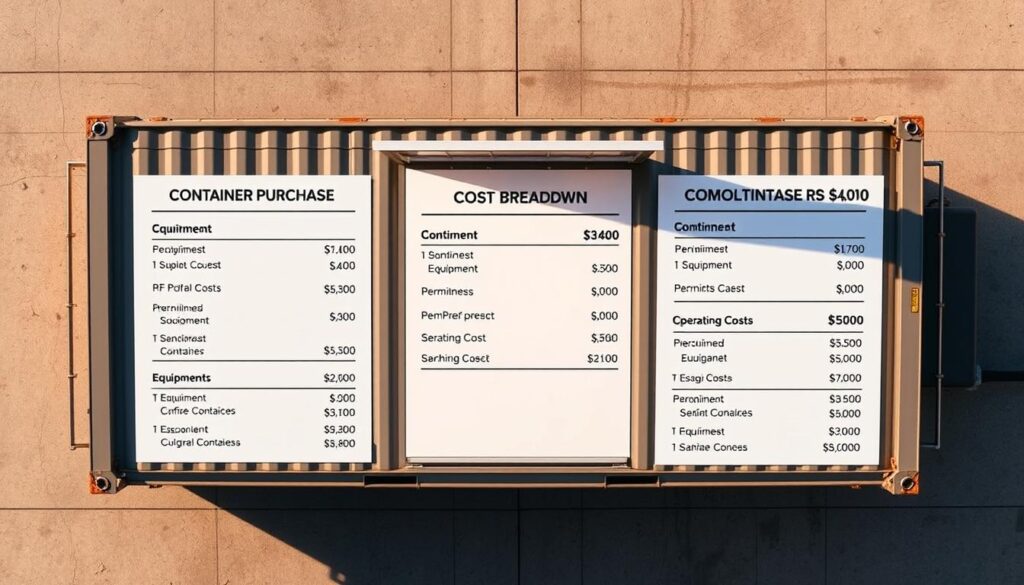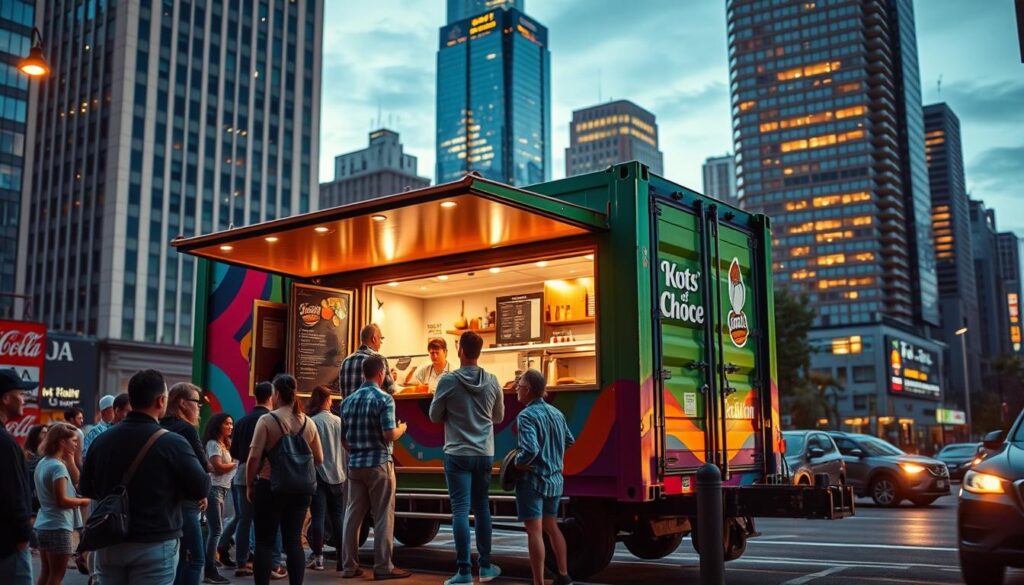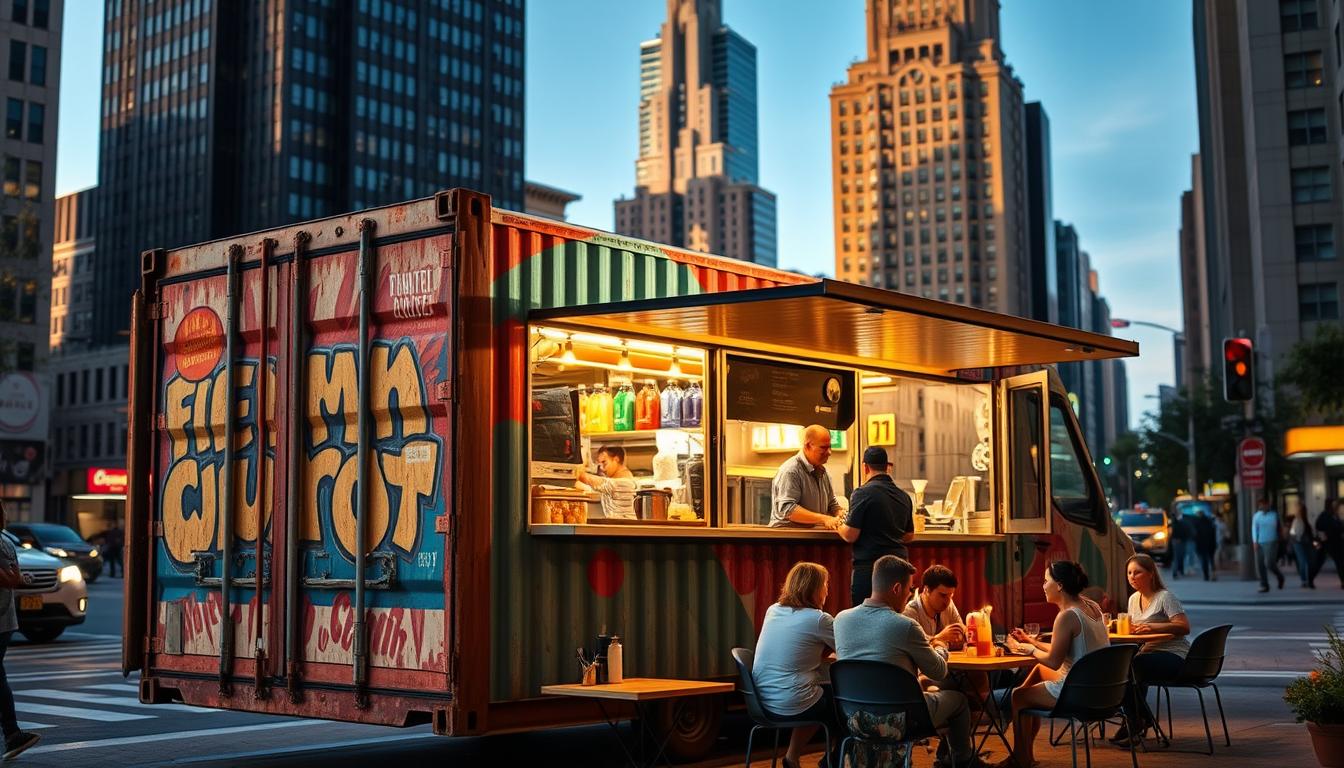Are you tired of the same old dining experiences? Imagine being able to enjoy your favorite mobile kitchen cuisine in a unique and innovative setting.
The rise of shipping container food trucks is revolutionizing the way we think about dining on the go. Made from repurposed shipping containers, these food truck businesses offer a sustainable and cost-effective alternative to traditional eateries.
Key Takeaways
- Shipping container food trucks provide a unique dining experience.
- They are made from repurposed shipping containers, making them sustainable.
- These mobile kitchens offer a cost-effective alternative to traditional food trucks.
- They can be easily relocated to different areas.
- Shipping container food trucks are perfect for entrepreneurs looking to start a food business.
The Rise of Mobile Dining Experiences
As consumers increasingly seek unique dining experiences, the demand for mobile food services has surged, revolutionizing the way we eat on the go. This shift has been driven by the evolving preferences of food enthusiasts and the adaptability of mobile kitchens.
Evolution of Food Trucks in American Culture
Food trucks have become an integral part of American culinary culture, transitioning from simple street vendors to sophisticated mobile kitchens. This evolution has been marked by advancements in food truck design and the incorporation of shipping containers as a viable option for mobile food service.
Why Containers Have Revolutionized Mobile Food Service
Shipping containers have revolutionized the mobile food industry by offering a cost-effective, customizable, and sustainable solution. Their use has enabled entrepreneurs to establish unique brand identities and cater to diverse consumer preferences.
Sustainability Factors
The use of shipping containers in mobile food service has several sustainability benefits, including:
- Reduced waste through the repurposing of existing containers
- Energy efficiency in container design and operations
- Minimal environmental impact compared to traditional construction methods
Aesthetic Appeal
Containerized food trucks offer a unique aesthetic appeal, allowing for creative designs that attract customers and differentiate businesses in a competitive market. The visual appeal of these mobile kitchens is a significant factor in their popularity.
What Makes a Shipping Container Food Truck Unique
Shipping container food trucks are revolutionizing the mobile dining experience with their unique blend of functionality and style. They offer a distinct alternative to traditional food trucks, providing a more spacious and comfortable working environment for chefs and staff.
Comparing Traditional Food Trucks vs. Container Models
When considering a custom food truck or a small business food truck, entrepreneurs often weigh the benefits of traditional food trucks against shipping container models. Traditional food trucks are typically custom-built on a truck chassis, offering a compact, streamlined design. In contrast, shipping container food trucks are built using repurposed shipping containers, providing a more spacious interior and a unique aesthetic.
Advantages of Container-Based Mobile Kitchens
Container-based mobile kitchens offer several advantages, making them an attractive option for food truck start-up businesses. Two key benefits stand out:
Structural Integrity
Shipping containers are designed to withstand harsh marine environments, making them incredibly durable. This structural integrity ensures that the food truck can operate in various weather conditions without compromising the safety and quality of the food served.
One of the most significant advantages of shipping container food trucks is their potential for expansion. Containers can be joined together or modified to create larger kitchen spaces or additional serving areas, offering flexibility as the business grows.
By leveraging these advantages, entrepreneurs can create a successful and unique dining experience that sets their business apart in the competitive food truck industry.
Designing Your Shipping Container Food Truck
Creating a shipping container food truck that stands out requires a thoughtful approach to design. This involves careful consideration of several key elements to ensure your mobile kitchen is both functional and appealing to customers.
Space Planning and Layout Considerations
Effective space planning is crucial in a shipping container food truck, where every square foot counts. Efficient layout can significantly enhance workflow and customer experience. Consider the flow of staff and customers, and plan for adequate storage, preparation areas, and service windows.
- Assess your menu and operational needs to determine the necessary equipment and space requirements.
- Utilize vertical space with shelving and storage solutions to maximize floor area.
- Designate clear zones for food preparation, cooking, and customer service to maintain a smooth workflow.
Equipment Selection for Containerized Kitchens
Selecting the right equipment for your shipping container food truck is vital for delivering high-quality food and maintaining operational efficiency. Consider energy-efficient and compact equipment that meets your menu requirements.
- Choose multi-functional equipment to minimize space usage.
- Invest in energy-efficient appliances to reduce operational costs.
- Ensure all equipment is compatible with your container’s electrical and plumbing systems.
Interior and Exterior Design Elements
The interior and exterior design of your shipping container food truck plays a significant role in attracting customers and creating a memorable dining experience. Brand identity should be reflected in both the interior and exterior design.
Customer-Facing Features
Customer-facing features such as service windows, outdoor seating, and signage are crucial for enhancing the customer experience. Consider:
- Designing an attractive and functional service window.
- Incorporating comfortable outdoor seating areas.
- Creating eye-catching signage that reflects your brand.
Kitchen Workflow Optimization
Optimizing kitchen workflow is essential for efficient food preparation and service. This includes:
- Streamlining kitchen processes to reduce wait times.
- Implementing a logical workflow that minimizes staff movement.
- Ensuring adequate lighting and ventilation in the kitchen area.
By focusing on these design elements, you can create a shipping container food truck that is not only visually appealing but also highly functional, enhancing both the customer experience and operational efficiency.
The Shipping Container Conversion Process
Turning a shipping container into a thriving food truck business requires a thorough understanding of the conversion process. This involves several critical steps that transform a simple container into a fully functional mobile kitchen.
Selecting the Right Container Size and Type
The first step in converting a shipping container into a food truck is selecting the appropriate size and type. Containers come in various sizes, typically 10, 20, or 40 feet in length. The choice depends on the menu, equipment needs, and the number of staff to be accommodated.
Container sizes and their typical uses:
| Container Size | Typical Use |
|---|---|
| 10 feet | Ideal for small operations or specialty food vendors |
| 20 feet | Suitable for most food truck operations, offering a balance between mobility and kitchen space |
| 40 feet | Best for large operations or those requiring extensive equipment and storage |
Structural Modifications and Reinforcements
Once the right container is selected, structural modifications are necessary to accommodate kitchen equipment, windows, doors, and ventilation systems. Reinforcements may be needed to ensure the structural integrity of the container, especially when making significant alterations.
Key modifications include:
- Cutting out sections for windows and doors
- Installing serving windows and counters
- Reinforcing the structure to support heavy equipment
Utilities Installation: Plumbing, Electrical, and Ventilation
A crucial aspect of the conversion process is the installation of utilities. This includes plumbing for water supply and waste disposal, electrical systems to power equipment, and ventilation to remove cooking fumes and maintain a comfortable working environment.
Health Code Compliance Features
Ensuring that the container food truck complies with health codes is paramount. This involves installing proper waste disposal systems, sanitation stations, and ensuring that all equipment meets health and safety standards.
Legal Requirements and Permits for Container Food Businesses
Understanding the legal framework is essential for entrepreneurs venturing into the container food business. Compliance with various regulations is crucial for the smooth operation of a food truck business.
Health Department Regulations
Container food businesses must adhere to health department regulations, which typically include maintaining proper food handling practices, ensuring cleanliness, and undergoing regular health inspections. For instance, in Florida, food truck operators must obtain a Mobile Food Dispenser License from the Department of Agriculture and Consumer Services.
Zoning and Parking Considerations
Zoning laws dictate where a small business food truck can operate. Entrepreneurs must research local zoning regulations to identify permissible operating areas. Additionally, parking considerations are vital to avoid fines or penalties.
Business Licenses and Insurance Needs
Starting a food truck start-up requires obtaining necessary business licenses and insurance. This may include a business license, food service permit, and liability insurance to protect against potential risks.
State-Specific Requirements
It’s also important to note that regulations can vary significantly by state. For example, some states require additional permits for operating in certain areas or during specific events. Entrepreneurs should familiarize themselves with state-specific requirements to ensure compliance.
| Regulation Type | Description | Example Requirement |
|---|---|---|
| Health Department | Maintaining food safety and hygiene | Regular health inspections |
| Zoning Laws | Dictating operational areas | Permits for specific locations |
| Business Licenses | Legal operation of the business | Business license and food service permit |
In conclusion, navigating the legal requirements for a container food business can be complex, but understanding and complying with these regulations is crucial for success.
Cost Breakdown of Starting a Shipping Container Food Truck Business
Starting a food truck business using a shipping container involves various expenses that need careful planning. Entrepreneurs must consider both the initial investment and ongoing operational costs to ensure the viability of their venture.
Initial Investment: Container Purchase and Conversion
The initial investment for a shipping container food truck includes the cost of purchasing the container and converting it into a functional kitchen. The price of a standard shipping container can range from $2,000 to $5,000, depending on its size and condition. Conversion costs, which include installing kitchen equipment, plumbing, electrical systems, and ventilation, can add another $20,000 to $50,000 or more, depending on the complexity of the design and the quality of the equipment.
Key components of the initial investment include:
- Container purchase or rental
- Design and layout planning
- Kitchen equipment and appliances
- Plumbing, electrical, and ventilation systems
- Interior finishing and branding
Operational Costs and Considerations
Once the shipping container food truck is operational, there are several ongoing costs to consider. These include fuel for mobility, maintenance and repairs, insurance, and supplies. The cost of ingredients and labor will also be significant ongoing expenses. Effective management of these operational costs is crucial for maintaining profitability.
Some of the key operational costs include:
- Fuel and maintenance for the truck
- Ingredients and supplies
- Labor costs for staff
- Marketing and advertising expenses
- Insurance premiums

Return on Investment Analysis
To justify the investment in a shipping container food truck, entrepreneurs need to conduct a thorough return on investment (ROI) analysis. This involves projecting revenue based on sales and identifying opportunities to maximize profitability. Factors such as location, menu pricing, and customer demand will all impact the potential ROI.
Financing Options for Entrepreneurs
For many entrepreneurs, financing will be necessary to cover the initial investment and ongoing costs associated with a shipping container food truck business. Options may include traditional bank loans, alternative lenders, or investors. Some businesses may also qualify for grants or other forms of support, particularly if they are located in economically disadvantaged areas or are considered innovative.
Exploring financing options can help entrepreneurs:
- Cover initial startup costs
- Manage cash flow during slow periods
- Invest in marketing and growth initiatives
Marketing Strategies for Container-Based Food Businesses
To thrive, container-based food businesses must leverage a mix of digital marketing, community engagement, and brand identity. This multi-faceted approach helps attract and retain customers in a competitive market.
Building a Unique Brand Identity
Creating a distinctive brand identity is crucial for container-based food businesses. This involves developing a compelling brand story, visual identity, and consistent tone across all platforms. A strong brand identity helps differentiate your business from competitors and fosters customer loyalty.
Key elements of a unique brand identity include a memorable logo, cohesive color scheme, and engaging brand messaging. For instance, a food truck with a retro aesthetic might use vintage colors and typography to evoke nostalgia.
Social Media and Digital Marketing Approaches
In today’s digital age, a robust online presence is vital. Container-based food businesses should utilize social media platforms like Instagram and Facebook to showcase their offerings, share behind-the-scenes content, and engage with customers. Container trends can also be a valuable resource for staying updated on the latest industry developments.
Effective digital marketing strategies include:
- Posting high-quality food images
- Utilizing relevant hashtags
- Running targeted advertisements
- Engaging with followers through comments and direct messages
Community Engagement and Event Participation
Engaging with the local community is essential for building a loyal customer base. Participating in food festivals, collaborating with local businesses, and hosting events can help increase visibility and attract new customers.
Leveraging the Visual Appeal of Container Design
The unique visual appeal of shipping container food trucks can be a significant marketing advantage. Creative design elements, such as murals, signage, and outdoor seating, can make your business stand out and create a memorable customer experience.
| Marketing Strategy | Description | Benefits |
|---|---|---|
| Brand Identity | Developing a unique visual and narrative brand presence | Increased customer loyalty, differentiation from competitors |
| Social Media | Utilizing platforms to share content and engage with customers | Enhanced online presence, customer engagement |
| Community Engagement | Participating in local events and collaborations | Increased visibility, local customer base |
Success Stories: Thriving Shipping Container Food Truck Businesses
Thriving shipping container food truck businesses are setting new standards in the culinary industry. By examining the success stories of Urban Container Cuisine in Portland and Coastal Container Seafood in Miami, entrepreneurs can gain valuable insights into what makes these ventures successful.
Case Study: Urban Container Cuisine in Portland
Urban Container Cuisine has become a staple in Portland’s vibrant food scene. Their shipping container food truck, converted from a 40-foot container, offers a unique dining experience with a focus on locally sourced ingredients. The success of Urban Container Cuisine can be attributed to its innovative menu and engaging social media presence.

Case Study: Coastal Container Seafood in Miami
Coastal Container Seafood in Miami has carved out a niche for itself with fresh seafood offerings. Their shipping container food truck is designed to resemble a coastal cafe, providing customers with an immersive dining experience. Key factors in their success include high-quality seafood and strategic location choices.
Lessons Learned from Successful Entrepreneurs
Successful shipping container food truck businesses share common traits that contribute to their success. These include:
- Unique branding and marketing strategies
- High-quality food offerings
- Effective use of social media
- Strategic location planning
By analyzing these success stories, entrepreneurs can develop their own strategies for a thriving shipping container food truck business.
| Business | Location | Key to Success |
|---|---|---|
| Urban Container Cuisine | Portland | Innovative Menu & Social Media |
| Coastal Container Seafood | Miami | High-Quality Seafood & Strategic Locations |
Overcoming Challenges in the Shipping Container Food Truck Industry
Shipping container food truck businesses face numerous challenges, but with the right strategies, they can thrive in a competitive market. Entrepreneurs in this industry must be prepared to address various obstacles to ensure the success of their mobile kitchen.
Mobility Limitations and Transportation Solutions
One of the primary challenges faced by shipping container food truck businesses is mobility limitations. To overcome this, owners can invest in reliable transportation solutions, such as sturdy towing equipment and regular maintenance checks.
Weather-Related Challenges
Weather conditions can significantly impact the operation of a shipping container food truck. Business owners can mitigate these effects by implementing weather-resistant equipment and having contingency plans in place.
Competition and Market Saturation
The increasing popularity of shipping container food trucks has led to increased competition in some markets. To stand out, businesses can focus on developing a unique brand identity and engaging with their local community.
Innovative Solutions from Industry Leaders
Industry leaders are continually developing innovative solutions to the challenges faced by shipping container food truck businesses. For example, some companies are using technology to streamline operations and improve customer engagement.
| Challenge | Solution |
|---|---|
| Mobility Limitations | Reliable transportation solutions |
| Weather-Related Challenges | Weather-resistant equipment and contingency plans |
| Competition and Market Saturation | Unique brand identity and community engagement |
Conclusion: Is a Shipping Container Food Truck Right for Your Culinary Vision?
Shipping container food trucks offer a unique and innovative solution for entrepreneurs looking to start or expand a food business. By considering the benefits and challenges of this business model, entrepreneurs can determine whether a shipping container food truck is right for their culinary vision.
When designing a custom food truck using a shipping container, it’s essential to consider factors such as size, layout, and equipment. For instance, 20-foot, 40-foot, and high-cube containers have different internal dimensions and volume capacities, which can impact the overall design and functionality of the food truck.
Ultimately, a well-planned shipping container food truck can be a successful and profitable venture. By understanding the intricacies of the food truck business and leveraging the advantages of a shipping container food truck, entrepreneurs can create a unique and captivating dining experience that sets them apart in the competitive food industry.

